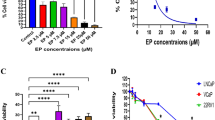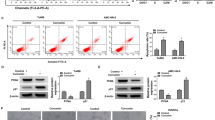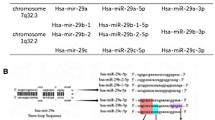Abstract
Prostate cancer (PC) is a prevalent cancer in aged men. Curcumin is an active ingredient that has been extracted from the rhizome of the plant Curcuma longa. Recently, a potential of Curcumin against PC has been reported in PC, whereas the underlying molecular mechanisms are not completely understood. Here, we studied the effects of low-dose Curcumin on PC cell growth. Curcumin (from 0.2 to 0.8 μmol/l) dose-dependently inhibited the proliferation of PC cells, without affecting cell apoptosis. Further analyses showed that Curcumin dose-dependently increased a cell cycle suppressor CDKN1A at protein levels, but not mRNA levels, in PC cells, suggesting that Curcumin may regulate the translation of CDKN1A, as well as a possible involvement of miRNA intervention. From all CDKN1A-3′-UTR-binding miRNAs, we found that miR-208 was specifically inhibited in PC cells dose-dependently by Curcumin. Moreover, miR-208 was found to bind CDKN1A to suppress its expression. In a loss-of-function experiment, PC cells that overexpressed miR-208 failed to decrease cell proliferation in response to Curcumin. Together, these data suggest that Curcumin inhibits growth of PC via miR-208-mediated CDKN1A activation.





Similar content being viewed by others
References
Wong YN, Ferraldeschi R, Attard G, de Bono J. Evolution of androgen receptor targeted therapy for advanced prostate cancer. Nat Rev Clin Oncol. 2014;11:365–76.
Chang AJ, Autio KA, Roach 3rd M, Scher HI. High-risk prostate cancer-classification and therapy. Nat Rev Clin Oncol. 2014;11:308–23.
Cetnar JP, Beer TM. Personalizing prostate cancer therapy: the way forward. Drug Discov Today. 2014;19:1483–7.
Lin R, Feng J, Dong S, Pan R, Zhuang H, Ding Z. Regulation of autophagy of prostate cancer cells by beta-catenin signaling. Cell Physiol Biochem. 2015;35:926–32.
Huang S, Liao Q, Li L, Xin D. Pttg1 inhibits smad3 in prostate cancer cells to promote their proliferation. Tumour Biol. 2014;35:6265–70.
Xia Q, Li C, Bian P, Wang J, Dong S. Targeting smad3 for inhibiting prostate cancer metastasis. Tumour Biol. 2014;35:8537–41.
Li T, Zhao X, Mo Z, Huang W, Yan H, Ling Z, et al. Formononetin promotes cell cycle arrest via downregulation of akt/cyclin d1/cdk4 in human prostate cancer cells. Cell Physiol Biochem. 2014;34:1351–8.
Gillies K, Wertman J, Charette N, Dupre DJ. Anterograde trafficking of cxcr4 and ccr2 receptors in a prostate cancer cell line. Cell Physiol Biochem. 2013;32:74–85.
Qian Y, Ma J, Guo X, Sun J, Yu Y, Cao B, et al. Curcumin enhances the radiosensitivity of u87 cells by inducing dusp-2 up-regulation. Cell Physiol Biochem. 2015;35:1381–93.
Fu XY, Zhang DW, Li YD, Zhao PW, Tang YQ, Niu JZ, et al. Curcumin treatment suppresses ccr7 expression and the differentiation and migration of human circulating fibrocytes. Cell Physiol Biochem. 2015;35:489–98.
Pu Y, Zhang H, Wang P, Zhao Y, Li Q, Wei X, et al. Dietary curcumin ameliorates aging-related cerebrovascular dysfunction through the ampk/uncoupling protein 2 pathway. Cell Physiol Biochem. 2013;32:1167–77.
Manju M, Vijayasree AS, Akbarsha MA, Oommen OV. Protective effect of dietary curcumin in anabas testudineus (bloch) with a special note on DNA fragmentation assay on hepatocytes and micronucleus assay on erythrocytes in vivo. Fish Physiol Biochem. 2013;39:1323–30.
Cort A, Timur M, Ozdemir E, Ozben T. Effects of curcumin on bleomycin-induced apoptosis in human malignant testicular germ cells. J Physiol Biochem. 2013;69:289–96.
Dorai T, Diouri J, O'Shea O, Doty SB. Curcumin inhibits prostate cancer bone metastasis by up-regulating bone morphogenic protein-7. J Cancer Ther. 2014;5:369–86.
Horie S. Chemoprevention of prostate cancer: soy isoflavones and curcumin. Korean J Urol. 2012;53:665–72.
Sundram V, Chauhan SC, Ebeling M, Jaggi M. Curcumin attenuates beta-catenin signaling in prostate cancer cells through activation of protein kinase d1. PLoS One. 2012;7, e35368.
Aggarwal BB. Prostate cancer and curcumin: add spice to your life. Cancer Biol Ther. 2008;7:1436–40.
Chendil D, Ranga RS, Meigooni D, Sathishkumar S, Ahmed MM. Curcumin confers radiosensitizing effect in prostate cancer cell line pc-3. Oncogene. 2004;23:1599–607.
Wei X, Zhou D, Wang H, Ding N, Cui XX, Wang H, et al. Effects of pyridine analogs of curcumin on growth, apoptosis and nf-kappab activity in prostate cancer pc-3 cells. Anticancer Res. 2013;33:1343–50.
Wei X, Du ZY, Cui XX, Verano M, Mo RQ, Tang ZK, et al. Effects of cyclohexanone analogues of curcumin on growth, apoptosis and nf-kappab activity in pc-3 human prostate cancer cells. Oncol Lett. 2012;4:279–84.
Shankar S, Srivastava RK. Involvement of bcl-2 family members, phosphatidylinositol 3'-kinase/akt and mitochondrial p53 in curcumin (diferulolylmethane)-induced apoptosis in prostate cancer. Int J Oncol. 2007;30:905–18.
Xiao X, Gaffar I, Guo P, Wiersch J, Fischbach S, Peirish L, et al. M2 macrophages promote beta-cell proliferation by up-regulation of smad7. Proc Natl Acad Sci U S A. 2014;111:E1211–20.
Wu X, Yang N, Zhou WH, Xu J, Chen JJ, Zheng FM, et al. Up-regulation of p21 inhibits trail-mediated extrinsic apoptosis, contributing resistance to saha in acute myeloid leukemia cells. Cell Physiol Biochem. 2014;34:506–18.
Stockl S, Gottl C, Grifka J, Grassel S. Sox9 modulates proliferation and expression of osteogenic markers of adipose-derived stem cells (asc). Cell Physiol Biochem. 2013;31:703–17.
Li LQ, Li XL, Wang L, Du WJ, Guo R, Liang HH, et al. Matrine inhibits breast cancer growth via mir-21/pten/akt pathway in mcf-7 cells. Cell Physiol Biochem. 2012;30:631–41.
Mihailidou C, Papazian I, Papavassiliou AG, Kiaris H. Chop-dependent regulation of p21/waf1 during er stress. Cell Physiol Biochem. 2010;25:761–6.
Jian H, Zhao Y, Liu B, Lu S. Sema4b inhibits growth of non-small cell lung cancer in vitro and in vivo. Cell Signal. 2015;27:1208–13.
Ge Z, Zhang B, Bu X, Wang Y, Xiang L, Tan J. Molecular mechanism of activating protein-4 regulated growth of hepatocellular carcinoma. Tumour Biol. 2014;35:12441–7.
Wang W, Wu X, Tian Y. Crosstalk of ap4 and tgfbeta receptor signaling in nsclc. Tumour Biol. 2015;36:447–52.
Sicard F, Gayral M, Lulka H, Buscail L, Cordelier P. Targeting mir-21 for the therapy of pancreatic cancer. Mol Ther. 2013;21:986–94.
Tavano F, di Mola FF, Piepoli A, Panza A, Copetti M, Burbaci FP, et al. Changes in mir-143 and mir-21 expression and clinicopathological correlations in pancreatic cancers. Pancreas. 2012;41:1280–4.
Ali S, Ahmad A, Banerjee S, Padhye S, Dominiak K, Schaffert JM, et al. Gemcitabine sensitivity can be induced in pancreatic cancer cells through modulation of mir-200 and mir-21 expression by curcumin or its analogue cdf. Cancer Res. 2010;70:3606–17.
Li H, Zheng D, Zhang B, Liu L, Ou J, Chen W, et al. Mir-208 promotes cell proliferation by repressing sox6 expression in human esophageal squamous cell carcinoma. J Transl Med. 2014;12:196.
Liu A, Shao C, Jin G, Liu R, Hao J, Song B, et al. Mir-208-induced epithelial to mesenchymal transition of pancreatic cancer cells promotes cell metastasis and invasion. Cell Biochem Biophys. 2014;69:341–6.
Huang SQ, Liao QJ, Wang XW, Xin DQ, Chen SX, Wu QJ, et al. Rnai-mediated knockdown of pituitary tumor- transforming gene-1 (pttg1) suppresses the proliferation and invasive potential of pc3 human prostate cancer cells. Braz J Med Biol Res. 2012;45:995–1001.
Conflicts of interest
None.
Author information
Authors and Affiliations
Corresponding author
Additional information
The Publisher and Editor retract this article in accordance with the recommendations of the Committee on Publication Ethics (COPE). After a thorough investigation we have strong reason to believe that the peer review process was compromised.
An erratum to this article is available at http://dx.doi.org/10.1007/s13277-017-5487-6.
About this article
Cite this article
Guo, H., Xu, Y. & Fu, Q. RETRACTED ARTICLE: Curcumin inhibits growth of prostate carcinoma via miR-208-mediated CDKN1A activation. Tumor Biol. 36, 8511–8517 (2015). https://doi.org/10.1007/s13277-015-3592-y
Received:
Accepted:
Published:
Issue Date:
DOI: https://doi.org/10.1007/s13277-015-3592-y




